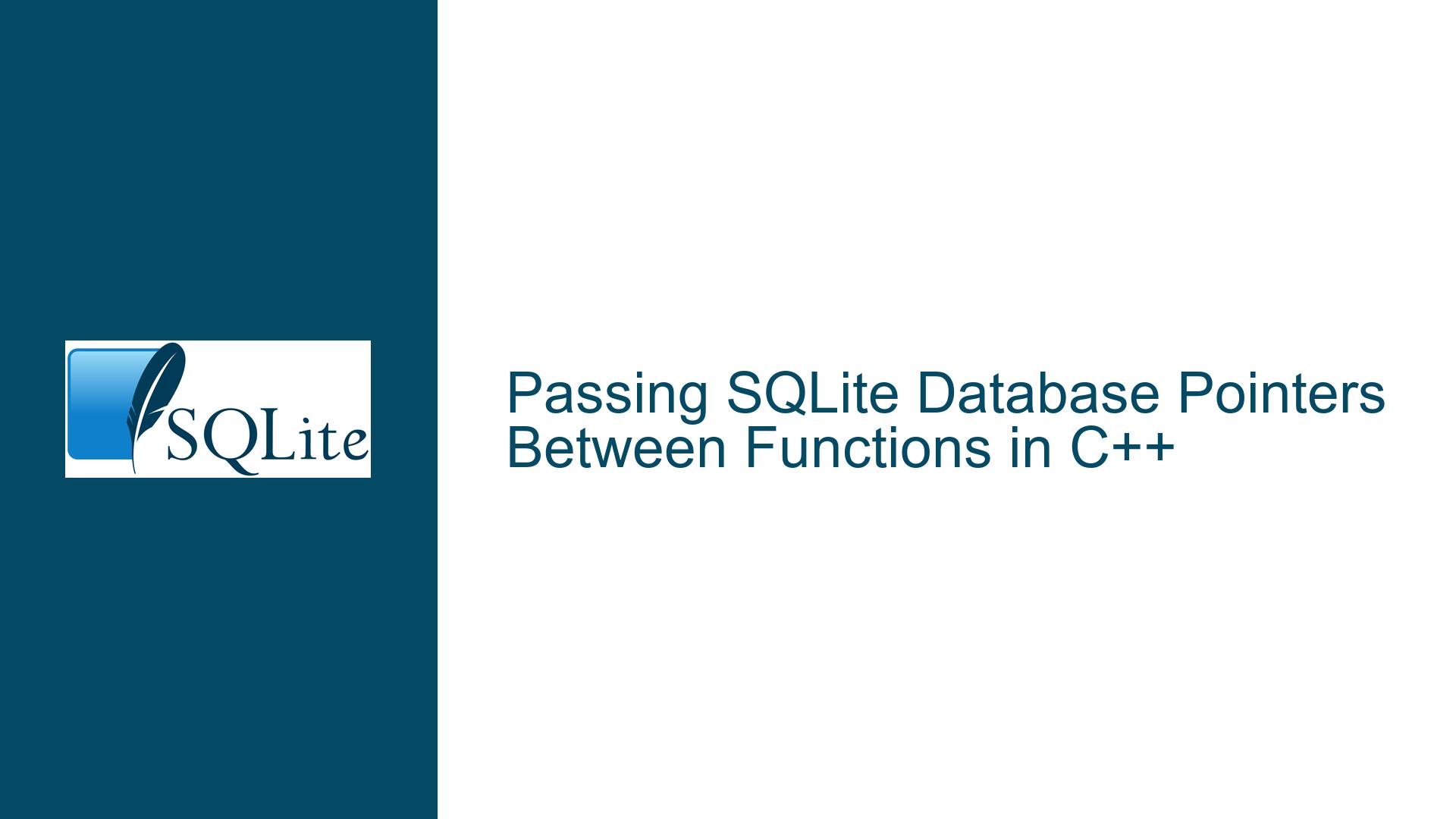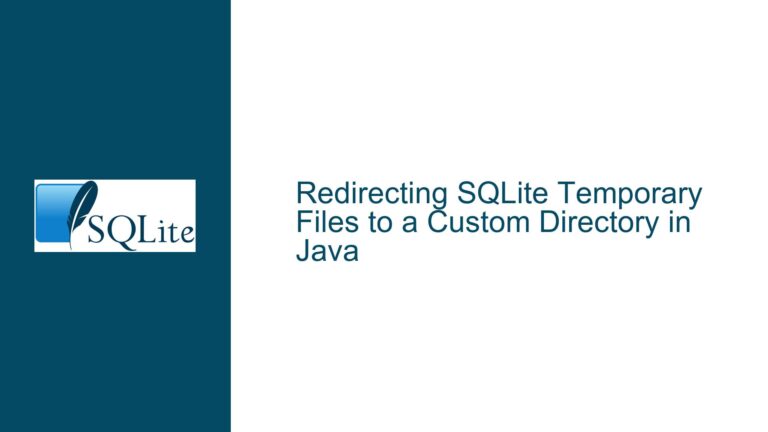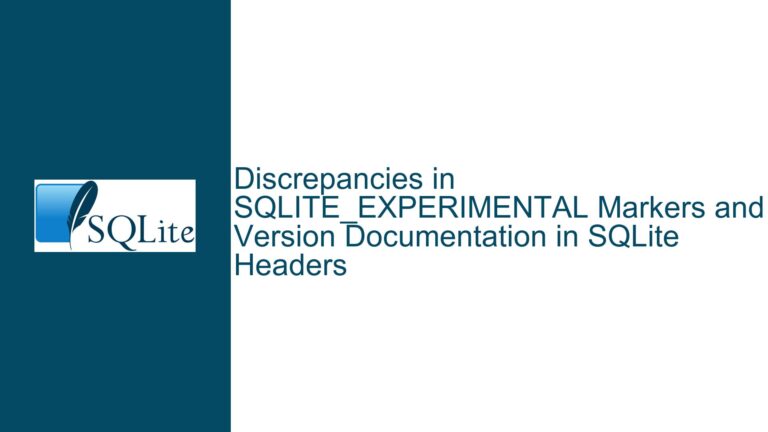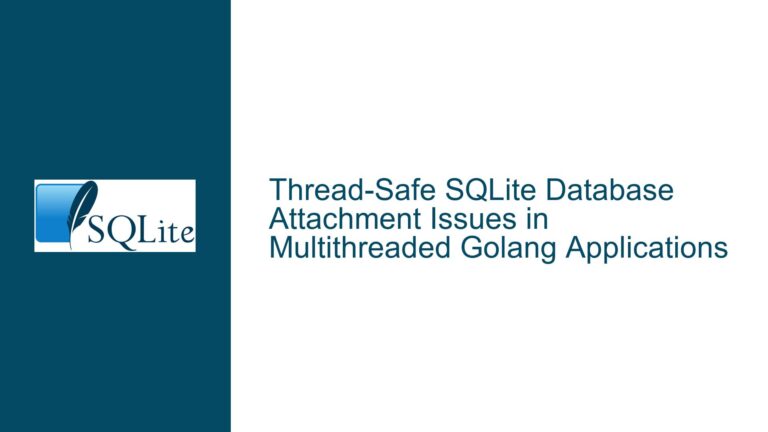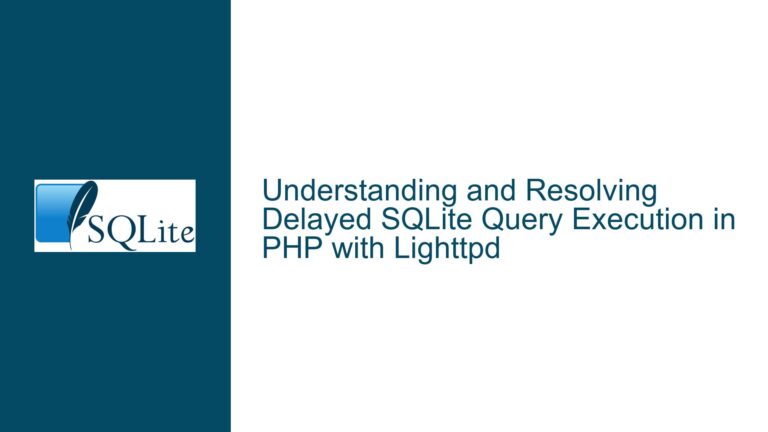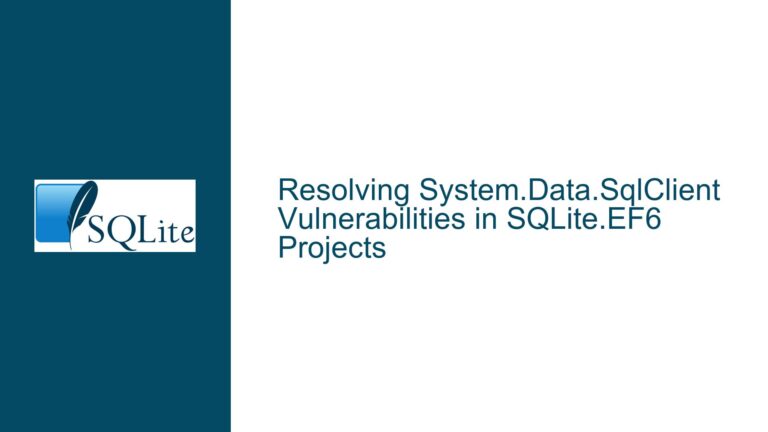Passing SQLite Database Pointers Between Functions in C++
Understanding SQLite3 API and Pointer Management in C++
The core issue revolves around effectively managing SQLite database pointers (sqlite3*) and statement pointers (sqlite3_stmt*) across multiple functions in a C++ program. The goal is to separate the database connection logic (using sqlite3_open_v2) from the query execution logic (using sqlite3_exec or sqlite3_prepare_v2). This separation is crucial for modularity, reusability, and maintaining clean code. However, the challenge lies in correctly passing and managing these pointers, especially for developers transitioning from other programming languages or those revisiting C++ after a long hiatus.
SQLite is a C library, and its API heavily relies on pointers to opaque types. These pointers represent database connections, prepared statements, and other resources. In C++, these pointers must be managed carefully to avoid memory leaks, dangling pointers, or undefined behavior. The confusion often arises from the interplay between C-style pointers and C++ features like references, RAII (Resource Acquisition Is Initialization), and exception handling.
Common Pitfalls in Passing SQLite Pointers Between Functions
One of the primary challenges is understanding how to pass SQLite pointers between functions without losing their validity or causing memory issues. In C++, pointers can be passed by value, by reference, or by pointer-to-pointer. Each method has its nuances, and choosing the wrong approach can lead to subtle bugs.
For instance, passing a sqlite3* pointer by value means the function receives a copy of the pointer. While this is generally safe for read-only operations, it can be problematic if the function needs to modify the pointer itself (e.g., opening a new database connection). On the other hand, passing a pointer by reference (using &) or by pointer-to-pointer (sqlite3**) allows the function to modify the original pointer, which is necessary for functions like sqlite3_open_v2.
Another common pitfall is failing to manage the lifetime of SQLite resources. SQLite pointers must be explicitly closed or finalized using functions like sqlite3_close or sqlite3_finalize. In C++, this can be error-prone if done manually, especially in the presence of exceptions. RAII-based wrappers or smart pointers can help automate resource management, but they require a deep understanding of how SQLite resources interact with C++ constructs.
Step-by-Step Solutions for Managing SQLite Pointers in C++
To address these challenges, let’s break down the process into actionable steps:
Separate Database Connection and Query Execution Logic
Create a dedicated function for opening a database connection usingsqlite3_open_v2. This function should return asqlite3*pointer, which can then be passed to other functions for query execution. For example:sqlite3* openDatabase(const char* filename) { sqlite3* db = nullptr; int rc = sqlite3_open_v2(filename, &db, SQLITE_OPEN_READWRITE | SQLITE_OPEN_CREATE, nullptr); if (rc != SQLITE_OK) { // Handle error (e.g., log or throw an exception) return nullptr; } return db; }Pass SQLite Pointers Safely Between Functions
When passing thesqlite3*pointer to other functions, pass it by value. This ensures that the pointer remains valid throughout the function calls. For example:void executeQuery(sqlite3* db, const char* sql) { char* errMsg = nullptr; int rc = sqlite3_exec(db, sql, nullptr, nullptr, &errMsg); if (rc != SQLITE_OK) { // Handle error (e.g., log or throw an exception) sqlite3_free(errMsg); } }Use RAII for Resource Management
To avoid manual resource management, wrap SQLite pointers in RAII-based classes. For example, create aDatabaseclass that automatically closes the database connection in its destructor:class Database { public: Database(const char* filename) { int rc = sqlite3_open_v2(filename, &db, SQLITE_OPEN_READWRITE | SQLITE_OPEN_CREATE, nullptr); if (rc != SQLITE_OK) { throw std::runtime_error("Failed to open database"); } } ~Database() { if (db) { sqlite3_close(db); } } sqlite3* get() const { return db; } private: sqlite3* db = nullptr; };Handle Prepared Statements Safely
For prepared statements (sqlite3_stmt*), use a similar RAII approach. Create aStatementclass that automatically finalizes the statement in its destructor:class Statement { public: Statement(sqlite3* db, const char* sql) { int rc = sqlite3_prepare_v2(db, sql, -1, &stmt, nullptr); if (rc != SQLITE_OK) { throw std::runtime_error("Failed to prepare statement"); } } ~Statement() { if (stmt) { sqlite3_finalize(stmt); } } sqlite3_stmt* get() const { return stmt; } private: sqlite3_stmt* stmt = nullptr; };Integrate RAII Wrappers into Your Code
Use theDatabaseandStatementclasses in your main logic to ensure automatic resource management:int main() { try { Database db("example.db"); Statement stmt(db.get(), "SELECT * FROM my_table"); // Execute and process the query } catch (const std::exception& e) { // Handle exceptions } return 0; }Consider Using Existing C++ Wrappers
If you prefer not to write your own RAII wrappers, consider using existing C++ libraries like SQLiteCpp or sqlite_modern_cpp. These libraries provide high-level abstractions for SQLite operations, making it easier to manage resources and write clean code.
By following these steps, you can effectively manage SQLite pointers in C++, ensuring modularity, safety, and maintainability. The key is to leverage C++ features like RAII and smart pointers to automate resource management while adhering to SQLite’s C-style API. This approach not only simplifies your code but also reduces the risk of memory leaks and other common pitfalls.
